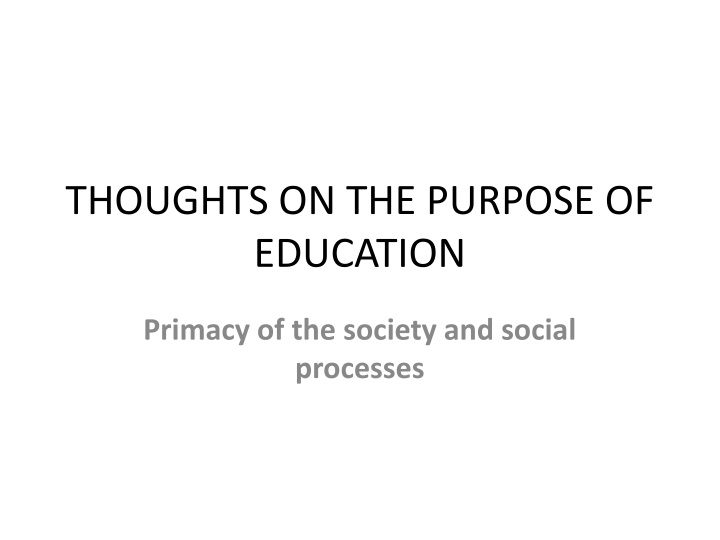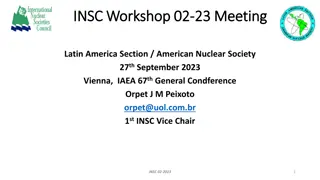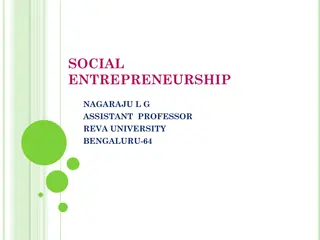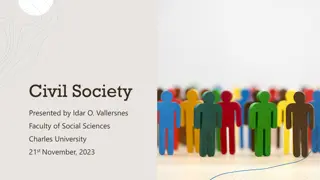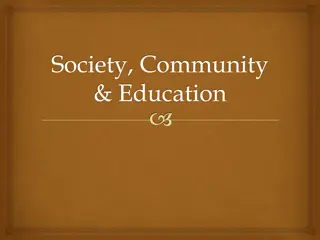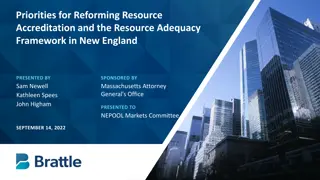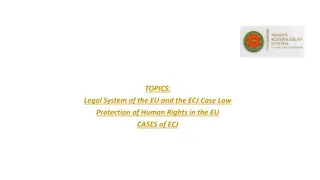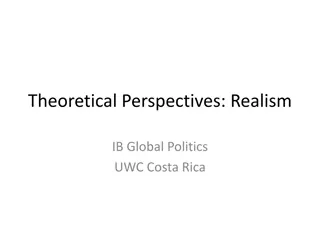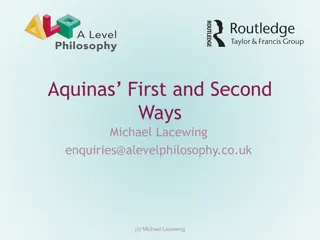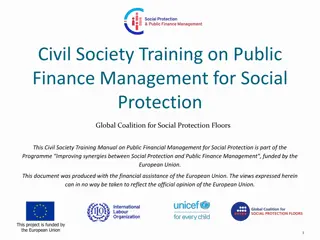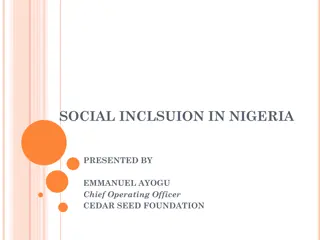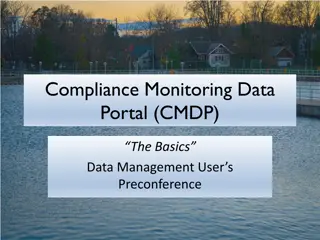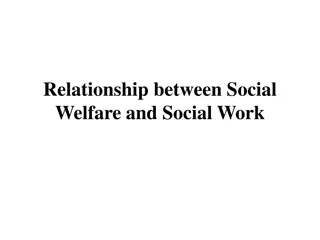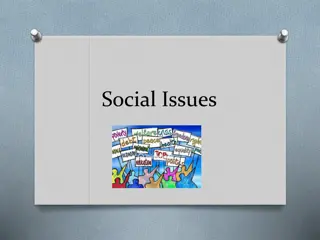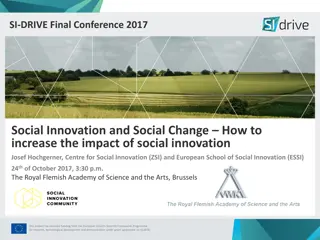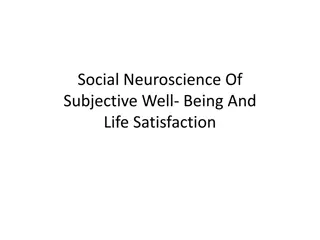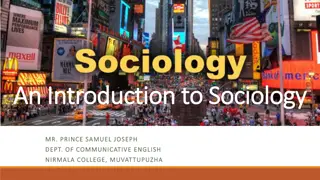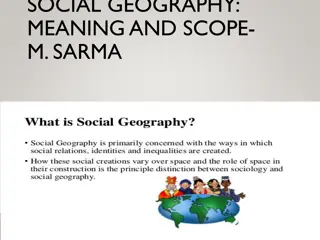Primacy of Society and Social Processes in Education
Focus on the interaction between education and society, emphasizing the impact of social factors on the learning process and the importance of addressing societal challenges in educational curricula. Ideas from Plato and John Dewey underscore the need for education to prepare individuals for societal roles and responsibilities.
Download Presentation

Please find below an Image/Link to download the presentation.
The content on the website is provided AS IS for your information and personal use only. It may not be sold, licensed, or shared on other websites without obtaining consent from the author.If you encounter any issues during the download, it is possible that the publisher has removed the file from their server.
You are allowed to download the files provided on this website for personal or commercial use, subject to the condition that they are used lawfully. All files are the property of their respective owners.
The content on the website is provided AS IS for your information and personal use only. It may not be sold, licensed, or shared on other websites without obtaining consent from the author.
E N D
Presentation Transcript
THOUGHTS ON THE PURPOSE OF EDUCATION Primacy of the society and social processes
Primacy of the society and social processes Focuses on the basis that any education process takes place within the society. This means the process of education is influenced by factors, issues, conditions or problems prevalent in the society. This means students build their knowledge base within the social context. Second, human mind is influenced or else affected by many social processes or events that take place within the community. Learners should be able to adjust themselves to these processes and events or their impact.
Primacy of the society and social processes Teaching and learning process must focus at identifying and isolating problems that impact on the every day life of society to which solution should be provided for a better future. It is the classroom learners and all others that must study these problems and think for a realistic solution for the future. This should form the basis of the school curriculum according to this thought. Since learners are hosted in a society there are society morals and ethics which form the important believes and values for which learners need to adhere to.
Primacy of the society and social processes Plato: Elementary. All boys and girls would be educated together. They would study mathematics, literature, poetry, and music until they were eighteen years of age. Plato recommended play method at elementary level. Plato wanted a place where children love to go and stay there and they play with things which enhance their education by playing. Military Training. The next two years of the youth's life would be devoted to physical education alone. Thereafter, the best youths would be selected for the higher education given to future guardians of the state.
Primacy of the society and social processes Higher Education. Between the ages of twenty and thirty-five, the future guardian would receive a higher education to prepare him for ruling the state. Teachers should lead a true moral life. They should practice what they preach. Primacy of the social process education based at confronting the challenges of every day living in the areas in which every one would best be trained for the service of the many and for good of the society as a whole.
Primacy of the society and social processes John Dewey The child learns best through direct personal experience. In the primary stage of education these experiences should revolve around games and occupations analogous to the activities through which mankind satisfies its basic material needs for food, clothing, shelter and protection. Occasionally children need to be alone and on their own. But in the main they will learn more by doing things together. By choosing what their group would like to do, planning their work, helping one another do it, trying out various ways and means of performing the tasks
Primacy of the society and social processes the youngsters would best develop their latent powers, their skill, understanding, self-reliance and cooperative habits. The questions and answers arising from such joint enterprises would expand the child s horizon by linking his immediate activities with the larger life of the community. Dewey aimed to integrate the school with society, and the processes of learning with the actual problems of life.
Primacy of the society and social processes The school system would be open to all on a completely free and equal basis without any restrictions or segregation on account of color, race, creed, national origin, sex or social status. This type of education would have the most beneficial social consequences. It would tend to erase unjust distinctions and prejudices. It would equip children with the qualities and capacities required to cope with the problems of a fast-changing world.
Primacy of the society and social processes Teachers will inspire a desire for knowledge, and will serve as guides in the investigations undertaken, rather than as task-masters. Scientific study of each pupil s development, physical, mental, social and spiritual, is absolutely essential to the intelligent direction of his development. Purpose of the society should determine the purpose of education which should determine the content of the curriculum. The curriculum should be both society centered and child centered
Primacy of the society and social processes Curriculum should include both aesthetics, moral and religious aspects of education, also the arts, crafts and physical training. Role of the teacher is: To help children to cope both with contemporary and future challenges Should foster and encourage group cooperation as a dimension of democratic process within the wider society
Primacy of the society and social processes James Aggrey Focused on vocational education promoting advancement of the rural community as a whole through improvement in agriculture, native industries and village crafts. Technical and industrial training, through a system of apprenticeship in government workshops Teaching of local languages to promote local African cultures. Objectives and methods of education
Primacy of the society and social processes To promote local industries To promote local languages To promote and empower important occupations existing in the society Training community youths on how to exploit indigenous raw materials sustainably Teaching these skills by involving the students in the actual situations
Primacy of the society and social processes Julius Nyerere That purpose is to transmit from one generation to the next the accumulated wisdom and knowledge of the society and to prepare the young people for their future membership of the society and their active participation in its maintenance or development But according to him, education is not something which must be done in the classrooms rather, it is a kind of learning from others and from past experience including our past success or failures.
Primacy of the society and social processes As he said, Education is learning from books, from radio, from films, from discussions about matters which affect our lives, and especially from doing things Education according to Nyerere must be used for the whole community Moreover, the purpose of primary school as Nyerere said is to be geared to the needs and realities of rural, agrarian life in the hope that standard seven leavers would become psychologically and technically prepared to accept that life.
Primacy of the society and social processes Efforts were to be made to relate academic subjects skills with the life which children see around them Being taught religion by the respective Religion instructors in the schools, but no one religion is binding on the pupil in their school life Also Swahili and English should be taught as subjects in the upper standards together with other subjects such as social studies, history, geography and civics which needed to be localised in order to meet local awareness and political needs, while agriculture, crafts, health education and home economics were introduced for proper rural integration and life.
Primacy of the society and social processes Secondary education must prepare people for life and service in the village and rural area of this country Before going to university or other courses, secondary school leavers were supposed to attend one year of military training. university is an institution of higher learning; a place where people s mind are trained for clear thinking, for independent thinking, for analysis, and for problem solving at the highest level Besides the transmission of advanced knowledge, a university provides a centre for the attempt to advance the frontier of knowledge and to prepare intellectual people who will take part in day to day administrative or professional responsibilities.
Primacy of the society and social processes Lastly, it provides for higher-level manpower that will serve the needs of society In line with his socialistic philosophy Nyerere emphasised that Universities must teach students to avoid arrogance and consider themselves as servants in training. He suggested, African Universities must attempt to be understood by African societies Adult education can cover many subjects for those who did not get an opportunity to be at school when they were young. This kind of education can be applied to every one without any exception. This was linked to the policies for rural development and also the bringing together of the people into Ujamaa villages.
Primacy of the learner Those who consider individual learners as the focus for organizing the school curriculum considers that: man is a superior creature to all other creatures on earth. According to this view man is born good and therefore the material world must respect his place, his interests and needs in nature. This means children s inclinations are divinely guided to follow the laws of nature. They are tender and they should be treated kindly and lovingly by the adult society into which they are born.
Primacy of the learner The adult society, the nurse and the teacher have to study the characteristics, the interests, the special problems and any other inclinations of the growing child so that the society handle the child or youth in the most fitting way possible. This means, the child or learner becomes the central point of reference in the design of the curriculum and the system of education in general. Thinkers under this view of education are:
Primacy of the learner Jean-Jacques Rousseau Central to this was the idea that it was possible to preserve the original perfect nature of the child, by means of the careful control of his education and environment, based on an analysis of the different physical and psychological stages through which he passed from birth to maturity Rousseau argued that the momentum for learning was provided by the growth of the person (nature) and that what the educator needed to do was to facilitate opportunities for learning.
Primacy of the learner A view of children as very different to adults as innocent, vulnerable, slow to mature and entitled to freedom and happiness. In other words, children are naturally good. The idea that people develop through various stages and that different forms of education may be appropriate to each. A guiding principle that what is to be learned should be determined by an understanding of the person s nature at each stage of their development.
Primacy of the learner An appreciation that individuals vary within stages and that education must as a result be individualized. Every mind has its own form Each and every child has some fundamental impulse to activity. Restlessness in time being replaced by curiosity; mental activity being a direct development of bodily activity. The power of the environment in determining the success of educational encounters. It was crucial as Dewey also recognized that educators attend to the environment. The more they were able to control it the more effective would be the education
Primacy of the learner Stress on the importance of developing ideas for ourselves, to make sense of the world in our own way. People must be encouraged to reason their way through to their own conclusions they should not rely on the authority of the teacher. Thus, instead of being taught other people s ideas, a child is encouraged to draw his own conclusions from his own experience.
Primacy of the learner Infancy 1: He sets the principle the spirit of which is to give children more real liberty and less power, to let them do more for themselves and demand less of others. Prepare in good time the freedom and the exercise of his powers, by allowing his body its natural habits and accustoming him always to be his own master and follow the dictates of his will as soon as he has a will of his own.
Primacy of the learner Stage 2: The age of Nature (two to 12): The mind should be left undisturbed till its faculties have developed (Everyman edn.: 57; Boyd: 41). The purpose of education at this stage is to develop physical qualities and particularly senses, but not minds. Stage 3: Pre-adolescence (12-15: The urge for activity now takes a mental form; there is greater capacity for sustained attention (Boyd 1956: 69). The educator has to respond accordingly.
Primacy of the learner Stage 4: Puberty (15-20): Rousseau believes that by the time a child is fifteen, his reason will be well developed, and he will then be able to deal with what he sees as the dangerous emotions of adolescence, and with moral issues and religion. Stage 5: Adulthood (20-25): He learns about love, and is ready to return to society, proof, Rousseau hopes, after such a lengthy preparation, against its corrupting influences. The final task of the tutor is to instruct the young couple in their marital rights and duties
Primacy of the learner Johann Heinrich Pestalozzi Instead of dealing with words, he argued, children should learn through activity and through things. They should be free to pursue their own interests and draw their own conclusions . He placed a special emphasis on spontaneity and self- activity. Children should not be given ready-made answers but should arrive at answers themselves. To do this their own powers of seeing, judging and reasoning should be cultivated, their self-activity encouraged.
Primacy of the learner The aim is to educate the whole child intellectual education is only part of a wider plan. He looked to balance, or keep in equilibrium, three elements hands, heart and head. As a little seed contains the design of the tree , so in each child is the promise of his potentiality. The educator only takes care that no untoward influence shall disturb nature s march of developments Love of those we would educate is the sole and everlasting foundation in which to work. Without love, neither the physical not the intellectual powers will develop naturally
Primacy of the learner To get rid of the verbosity of meaningless words Pestalozzi developed his doctrine of direct concrete observation, often inadequately perception or object lessons . No word was to be used for any purpose until observation has preceded. A man learns by action not mere words! Life shapes us and the life that shapes us is not a matter of words but action. There can be no doubt that within the living room of every household are united the basic elements of all true human education in its whole range . This underlines the potential of everyday life for educators. called sense adequate and concrete
Primacy of the learner Friedrich Froebel Friedrich Froebel, the German educationalist, is best known as the originator of the kindergarten system The purpose of education is to encourage and guide man as a conscious, thinking and perceiving being in such a way that he becomes a pure and perfect representation of that divine inner law through his own personal choice. education must show him the ways and meanings of attaining that goal.
Primacy of the learner Friedrich Froebel s enduring significance was through his formulation of the kindergarten system with its emphasis on play and its use of gifts (play materials) and occupations (activities). Friedrich Froebel believed that humans are essentially productive and creative and fulfillment comes through developing these in harmony with God and the world. As a result, Froebel sought to encourage the creation of educational environments that involved practical work and the direct use of materials.
Primacy of the learner Through engaging with the world, understanding unfolds. Hence the significance of play it is both a creative activity and through it children become aware of their place in the world. He went on to develop special materials (such as shaped wooden bricks and balls gifts), a series of recommended activities (occupations) and movement activities, and an linking set of theories Mathematics is the language of the universal laws that stem from the creator and govern all creation
Primacy of the learner Maria Montessori According to Montessori, a child develops through two distinct periods with different forms of sensitivity as follows: From birth to 6 years of birth: Children are characterized by high degree of sensitivity to sensory stimulation. These are the years of motor activities manifesting as they do practical skills that are needed for daily living. These require deliberate refinement because the use of these senses serves as avenues to the eventual training of the intellect.
Primacy of the learner From 7 to 18 years of age: Children lose much of their early plasticity but are able to build upon their sensory foundations and their early acquisition of the formal skills of reading, writing and numeration to be able to acquire forms of knowledge basic to academic attainment. In light of these observations Montessori evolved five important principles as follows:
Primacy of the learner Children are capable of sustained mental concentration when genuinely interested in their work. They love order and especially enjoy repetition of actions that they have already mastered They prefer work to play and prefer didactic materials to toys Rewards and punishment are unnecessary to motivate them The child has a deep sense of personal dignity that is easily offended. Montessori philosophy remained popular in various countries for training teachers
Primacy of the learner Anna Freud After many years of working with children and searching into child behavior and reactions, Freud arrived at three principles Children go through various normal stages of psychological development, with play being the child s mode of adaptation to reality but not necessarily as revealing unconscious conflicts or dilemmas
Primacy of the learner Psychoanalysts must have knowledge of these stages in order to be able to diagnose and treat mental illness in children Such knowledge can be obtained only through direct observation of children Anne Freud worked closely with parents as she believed that psychoanalysis would have a positive influence and impact on them as they grew up to become adolescents and eventually adults.
Primacy of the discipline or subject matter Philosophical thinking that base on the subject matter as the central focus of education rests on certain assumptions about the individual, society and social development. That knowledge must be carefully selected and then be presented using the appropriate method for both the learner or society to benefit from it. Therefore primacy of the subject matter as a basis for education reveals the following advantages:
Primacy of the discipline or subject matter Both the learner and the teacher go to the depth of the subject matter so effectively rather than studying it superficially Such a habit of treating the subject matter deeply promotes mental discipline of searching for further knowledge and understanding. It generates an intrinsic desire and motivation to learn more and more rather than relying on simple conclusions with no supporting evidence
Primacy of the discipline or subject matter It encourages an interpretative use of knowledge and therefore facilitates transfer of knowledge and training from one situation to another. Concentration on the subject matter leads to the development of intellects; an important ingredient in the quality of life in the society where at all times requires a class of perceptive intellectuals in its struggle to survive socially, economically, politically and culturally. Scholars advocating this mode are:
Primacy of the discipline or subject matter Jerome Bruner His focus was on teaching the material in a form that can be comprehended by the child and then later through instruction to build upon the intuitive understanding established. He had the assumption that any subject can be taught effectively in some intellectually honest form to any child at any stage of development. Some of his experimental results had these conclusions
Primacy of the discipline or subject matter Intellectual development of the child consists of the three major mental stages: pro-operational or manipulative, concrete operational and formal operational The act of learning involves manipulating knowledge which was previously learned to fit the new task The spiral curriculum involves logically sequenced program that begins at the lowest stage of concept and ends up at the highest levels of complexity.
Primacy of the discipline or subject matter He proposes the following pedagogical approaches: Presentation of the fundamentals of the subject matter by narrowing the gap between elementary and advanced knowledge Motivating the pupils for efficient and effective learning by using varieties of teaching techniques as a mean of increasing the learners interest to the material presented.
Primacy of the discipline or subject matter Careful and appropriate use of aids to assist the learner in understanding the subject matter such as: TV or video presentations, films, sound recordings and books, models etc. This is the means of extending the students range of experience. Harry Broudy, Othanel Smith and Joe Burnett They urged for the same education for all in regard to what should be taught
Primacy of the discipline or subject matter Education should be general education consisting of widely used knowledge and skills for dealing with life in its growing complexities in a changing society. The goal of curriculum according to them should be to equip the pupils with the mental tools for interpretation of knowledge. Hence school curriculum should focus on the following areas: symbolic skills, sciences, developmental studies, value exemplars and moral problem solving. These emphasize knowledge in the form of facts and norm
Primacy of the discipline or subject matter Arthur King and John Brownell They advocated a kind of curriculum with the following features: Curriculum which fulfill man s essential nature i.e a man who reasons, reflects, remembers, creates, meditates, imagines and seeks to control his acts with ethical considerations. Kind of curriculum which is most general, such that the curriculum content has the widest applicability and gives the highest power of understanding
Primacy of the discipline or subject matter The potential for the support and enrichment of other valid claims even though they may be less in priority The potential or practicality of content in such a curriculum as being the most learnable and teachable. The potential or practical observation of that view of man that looks beyond what man is and he sees him as he might be. Pedagogical characteristics might be:
Primacy of the discipline or subject matter Involving learning the symbolic system of the intellect-language number and form which then will be the fundamentals of the curriculum. Emphasizing aspects which give theoretical insight i.e insisting on intellectual elements. Emphasizing on the ways of knowing and inquiring for new knowledge It should be problem centre as the very core of each discipline is the problem of the pursuit of knowledge and truth.
Primacy of the discipline or subject matter Teachers must be intellectuals; persons of mature and expanding intellect, masters of the symbolic system and practitioners of a discipline of knowledge. Teachers must ordinarily subject himself to adequate academic study for the respectable qualification to teach competently and confidently. A teacher should be a reader, artist, listener and must have mature perspectives on the affairs of the day.
Primacy of the discipline or subject matter Should be associated with the quality of wonder for the unknown, pleasure in precision of word and thought, power and self esteem in valid generalizations and humility in knowledge of error. Ordering the subject matter in logical structures Identifying in each discipline of knowledge the key concepts, the general principles and understanding in how they are related.
